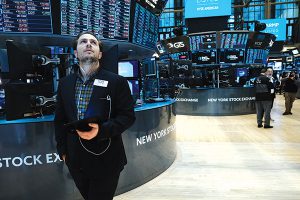Bloomberg
Stocks and US equity futures slid on Tuesday amid escalating US-China tension over Taiwan and deepening worries about a global economic slowdown, driving investors into the safety of government bonds.
The Stoxx Europe 600 falls 0.6%, with energy among the few industries bucking the trend after BP Plc hiked its dividend and accelerated share buybacks to the fastest pace yet after profits surged. An Asian share index slid the most in three weeks, with some of the steepest falls in Hong Kong, China and Taiwan. Contracts on the S&P 500 and Nasdaq 100 slumped as much as 0.8% as July’s equity market rebound stumbled into August.
US Treasury 10-year yields dropped for a fifth day and approached 2.5%, a level last seen in April, while the Japanese currency advanced to the strongest level in two months.
US House Speaker Nancy Pelosi landed in Taiwan. It would be the highest-ranking American politician to visit in 25 years. China views the island as its territory and has vowed an unspecified military response to any Pelosi visit.
The visit may end up being another “short-term dislocation†for markets but “it’s always concerning when they do happen,†Ayako Yoshioka, senior portfolio consultant at Wealth Enhancement group, said on Bloomberg Radio.
Pelosi’s trip is creating a fresh pressure point for investors already dealing with the prospects of a US recession, worldwide rate hikes and inflation that risks becoming entrenched as Russia’s war in Ukraine exacerbates food shortages.
China, which regards Taiwan as part of its territory, has vowed an unspecified military response to any Pelosi visit that risks sparking a crisis between the world’s biggest economies.
“Over the long run we fear that a Taiwan war is more likely than not†according to Matt Gertken, chief geopolitical strategist at BCA Research Inc. He recommends government bonds over equities, US defensive sectors and haven assets.
Investors are also keeping a wary eye out for more potentially hawkish comments from Federal Reserve officials about the need for higher interest rates to restrain elevated inflation. Expectations for how aggressive the Fed must be have receded because of recession risk, so any shift in those perceptions could stoke market volatility.
Goldman Sachs Group Inc. strategists led by Cecilia Mariotti said it was too soon for stock markets to fade the risks of a recession on expectations of a pivot in the Fed’s hawkish policy. JPMorgan Chase & Co. strategists, on the other hand, said the outlook for US stocks is improving for second half of the year on attractive valuations and as the peak in investor hawkishness has likely passed.
The prospect of a demand slowdown has sapped oil, leaving it around $94 a barrel. Oilseed and grain futures fell after the first grain ship since Russia’s invasion left Ukraine, heralding some relief for a tight global food market.
The Stoxx Europe 600 falls 0.6% as of 10:50 am London time and futures on the S&P 500 also drop 0.6%.
While futures on the Nasdaq 100 decline 0.8%, futures on the Dow Jones Industrial Average also fall 0.5%. The MSCI Asia Pacific Index drops 1.2% and the MSCI Emerging Markets Index also slumps 1.1%.
The Bloomberg Dollar Spot Index rises 0.1% and the euro falls 0.2% to $1.0237.
While the Japanese yen rises 0.6% to 130.87 per dollar, the offshore yuan climbs 0.2% to 6.7675 per dollar.
 The Gulf Time Newspaper One of the finest business newspapers in the UAE brought to you by our professional writers and editors.
The Gulf Time Newspaper One of the finest business newspapers in the UAE brought to you by our professional writers and editors.
